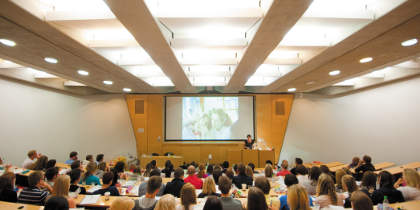
January 28, 2008, by Teaching at Nottingham
Vague expectations and diverse preferences: a study of undergraduate students at Nottingham University Business School
Mohsen Derregia: “The increased number of students in higher education has coincided with a shift towards seeing students as ‘customers’ who should have their expectations fulfilled to be satisfied. A number of studies have looked at student expectation about methods of education, such as lectures and seminars in the hope of identifying some factors that can help in designing courses. However, it is not clear how students form their expectations and what their preferences are. Without knowing this, it is not possible to fulfil expectations and satisfy students. This project uses focus groups to investigate the expectations of students at Nottingham University Business School (NUBS), which has large numbers of undergraduate students, and their preferences. In total, three focus groups were formed from volunteers who responded to a request for participation. Forty two students volunteered and, to form groups representing the three years of a typical UG degree that are also gender-balanced, some selection was necessary. Given that the majority of volunteers were females and most from the first year, nine females and seven males were selected to form three groups, one representing each year of the degree course. No criteria other than year and gender were used. The focus groups were asked to invite friends from other parts of the university known to have smaller class sizes. This is to control for the possibility that programmes with large numbers shape student expectations in a different way to programmes with small numbers. Three students, a first year, a second year, and a third year from science subjects joined the relevant NUBS groups.
“The three focus group sessions lasted an average of 60 minutes each. During the sessions my role was limited to asking simple general questions about expectations and preferences, then leaving it to the students to discuss their answers to the questions. Some moderating was necessary to keep the discussion on the answers to the key questions asked. These are: Why did you choose NUBS? What were you expecting from NUBS? Is NUBS as you expected and why? What methods of education delivery do you prefer? Students were encouraged to use examples to clarify and support their views and to limit retrospective answers. The focus groups sessions were recorded and professionally transcribed.
“The analysis of the data yielded the following results:
- Almost all participants chose NUBS on the basis of league tables – which also influence parents’ view of universities, and recommendations by teachers and word of mouth.
- Students have vague expectations about their university education at NUBS, but believed they will receive high quality education on the basis of the factors that made their choice.
- Once students join NUBS, their experiences quickly shape their expectations and preferences. Students are generally satisfied, but most felt that large lecture audiences made them feel anonymous. This makes them feel detached from faculty and lack a sense of belonging. However, students felt large classes often were negatively affected by noise from students.
- Students on small programmes outside NUBS interact more with faculty and other students, making the adjustment from the high student-teacher contact at pre-university school education to the style of university education easier.
- NUBS students cannot agree on preferred education methods, although they agree in disliking large groups, and indicate continuing with lectures is desirable provided the numbers were lowered.
- There is also disagreement on whether more compulsory attendance and preparation for tutorials should be introduced to encourage student participation.
“These results indicate there are serious and unique challenges facing NUBS in offering courses to large numbers of students. It may be possible to improve the student experience by increasing contact with personal tutors, especially when they first join NUBS. This would make adjustment from school to university easier. It is also highly likely that reducing lecture audiences will improve the experience and the satisfaction of students.”
Paper presented at the University’s Twelfth Learning & Teaching conference (January, 2008).
Dr Mohsen Derregia
Nottingham University Business School
This article was originally published as part of PESL’s Teaching at Nottingham collection.
No comments yet, fill out a comment to be the first

Leave a Reply